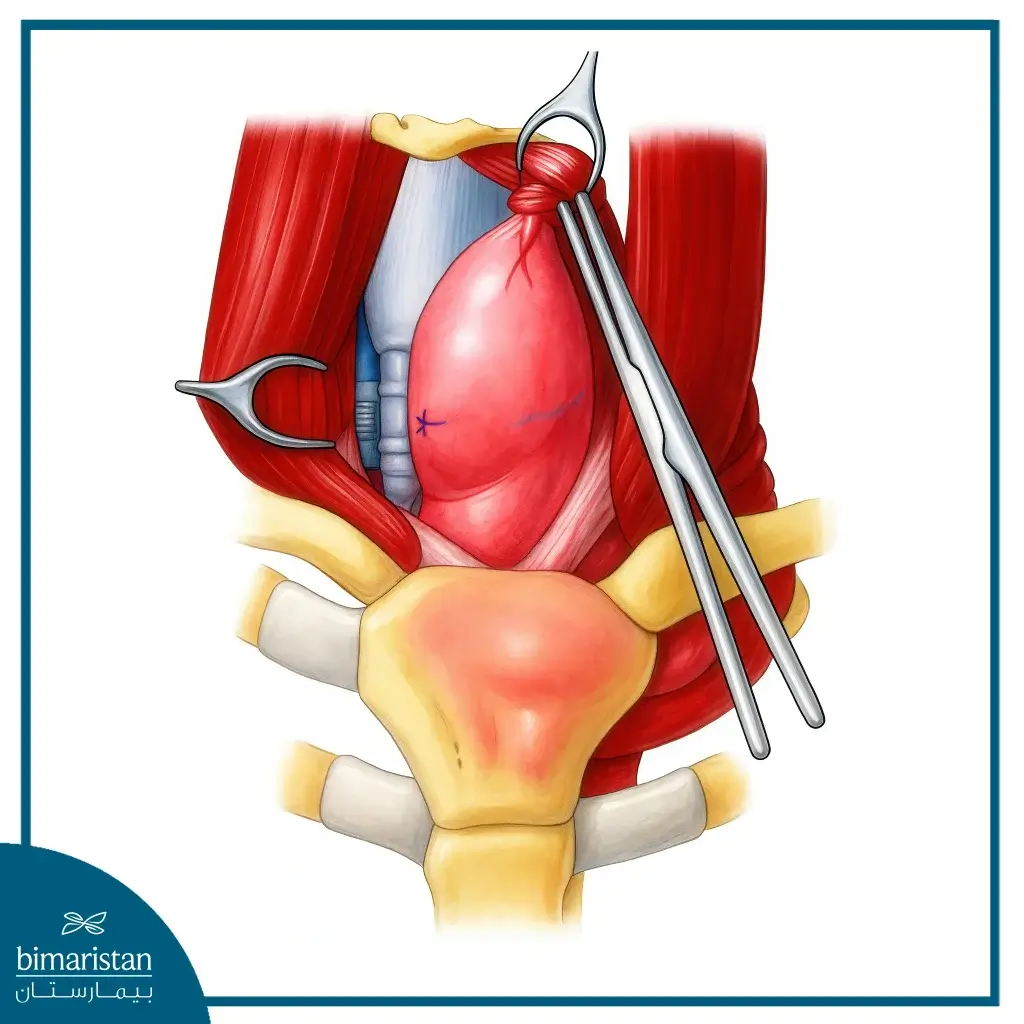Weight after thyroidectomy is one of the most common challenges patients face following surgery for functional disorders or tumors. The hormonal imbalance caused by gland removal directly impacts metabolism, leading to weight gain or loss depending on each patient’s individual response. Therefore, understanding the factors influencing weight after the operation and learning how to manage them safely and scientifically is essential.
Definition of thyroidectomy
The thyroid gland is a butterfly-shaped endocrine gland located in the front of the neck, just below the Adam’s apple. It plays a major role in producing and secreting hormones that control many essential functions throughout the human body, such as regulating heart rate and the speed of fat burning.
The amount of resection during the procedure depends on the reason for the procedure, as the gland may maintain normal function in a partial resection, while in a total resection, you will need daily thyroid hormone replacement therapy to restore gland function.
Thyroidectomy is a simple surgery performed under general anesthesia through a small horizontal incision in the front of the neck. In Turkey, it can be performed through a 3-4 cm incision using minimally invasive techniques, including laparoscopic thyroidectomy and robotic thyroidectomy.

Impact of thyroidectomy on the body
Thyroidectomy results in a cessation or decrease in the production of T3 and T4, which are primarily responsible for regulating the body’s metabolism. As a result of this decrease, thyroid-stimulating hormone (TSH) levels rise as a compensatory mechanism by the pituitary gland to stimulate the thyroid gland to produce hormones.
This hormonal imbalance has a negative impact on metabolism, which is associated with several disorders, including:
- Feeling tired
- Increased sensitivity to cold
- Constipation
- Dry skin
- Weight gain
- Puffiness of the face
- Roughness of the voice
- Hair and skin roughness
- Muscle weakness
- Muscle aches, pains, and stiffness
- More heavy or irregular menstrual bleeding than usual
- hair thinning
- Slow heart rate, also known as bradycardia
- Depression
- Memory issues
Weight after thyroidectomy
Weight disorders occur after thyroidectomy, which varies from person to person depending on the nature of the body, as
Weight gain
Due to the lack of thyroid hormone, which in turn leads to a slowdown in metabolism, the body’s functions are impaired, resulting in weight gain. This weight gain typically continues until hormonal drug treatment is adjusted to normalize thyroid hormones, at which point weight gain stops.
Thyroid hormones also affect body temperature and appetite regulation, so thyroidectomy increases appetite, causing weight gain
Weight loss
It is often caused by an overdose of hormone therapy leading to a hyperthyroid-like state, resulting in weight loss.
The psychological impact of surgery on weight
There are several psychological factors associated with thyroidectomy that affect weight, including:
- Laryngeal nerve damage is one of the main complications of thyroid surgery, which psychologically and socially affects patients, leading to weight disturbance.
- Psychological distress resulting from a cancer diagnosis can lead to changes in eating patterns and activity levels, as many patients experience an increase in anxiety or depressive symptoms, which are contributing factors to weight disturbance.
- Emotional eating—eating in response to stress rather than hunger—becomes more common in cases of chronic stress.
How to manage weight after thyroidectomy
- Hormone replacement therapy (thyroxine): Works to normalize T3 and T4 levels, restoring a normal metabolic rate and preventing unintended weight gain or loss.
- The importance of following up with a specialized doctor: To periodically monitor the levels of TSH and T3/T4 hormones, and perform medical tests for these hormones to ensure hormonal balance, which ensures the patient maintains weight.
- The role of proper nutrition in adapting to hormonal changes: A balanced diet rich in whole foods (proteins, vegetables, whole grains, healthy fats) supports the recovery process, regulates metabolism, and helps support good absorption of hormone replacement, ensuring weight control and stability.
- Exercise and physical activity: Regular physical activity, such as resistance training or moderate walking, boosts energy and calorie burning, helps prevent weight gain and maintenance, and mitigates the effects of low metabolism.
In conclusion, weight after thyroidectomy is influenced by multiple factors including hormones, diet, physical activity, and psychological state. These changes are not necessarily permanent but can be managed with proper hormonal therapy and a healthy lifestyle under medical supervision. Balance is key, and continuous follow-up ensures improvement and long-term weight stability.
Sources:
- Brooks, J. A., Fontanarosa, J. B., & Gigliotti, B. (2023). Post-thyroidectomy hypothyroidism and thyroid hormone supplementation: a narrative review of the history, treatment, and patient experience. Annals of Thyroid, 8, 30 June 2023.
- MedlinePlus. (2023). Thyroid gland removal – discharge. U.S. National Library of Medicine. Retrieved from
